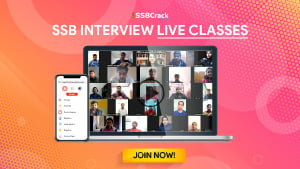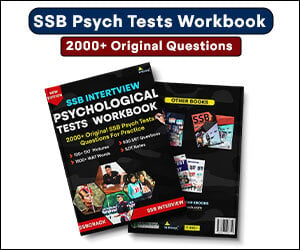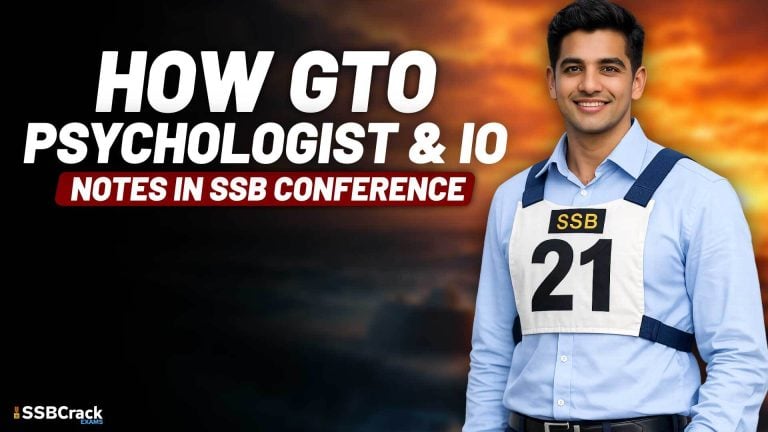In this first stage of SSB which is in the Screening Phase, a candidate is required to clear this stage in order to move on to the next phase of testing which is the psychological, GTO, and Interview followed by a Conference. Now suppose you were fully prepared for your next attempt, you have prepared your TAT stories, written your SD well, have good general knowledge and you are confident, you will get through this time. But to your Surprise, you get Screened out, various thoughts come to mind. How? why? it was not predictable, right? So in order to reach the second phase of Testing some key points should be remembered while performing in the first Phase. In this article, we shall discuss the same.
Screening Tips so that you will get Screened Next Time
Excel OIR (Officer’s Intelligence Rating)
OIR is Important. There is a myth that Marks of OIR are not counted in the screening phase. But you should think if it were true, why would be they conducting OIR on the first day and rather not on the second or third? If you are a repeater then you are already familiar with the OIR questions being asked, but if you are a fresher, you should focus on your verbal and non-verbal abilities. In OIR a candidate is given ample time so time is not the issue here, but accuracy is. Sometimes, you are made to sit in the testing hall so close that the answers of the candidates can easily be seen, so try to avoid the disclosure of your answer, remember you are there for your selection. You can refer to the SSBCrack OIR book to improve your OIR marks and rating.
Improve your Writing and Speed
Although the accessor there reads the story that you have written on the paper, most of the time he just generally takes a view of your paper and does not actually read it thoroughly. But the thing here is if he is looking at your paper he is looking for something right? But we don’t know that, so apart from the story, the other thing that impresses the accessor will be your handwriting. It is the first impression that accessors get from you. Most of the time, due to time limits, candidates are not able to complete the story and write in a very haphazard way. So here the speed factor comes. Writing a 10-12 lines story is not a big deal with good writing in 4-5 minutes. All you need is to practice.
Write a Logical Story with real meaning and sense
Don’t try to be a hero in the story. Be a common man with common solutions. Be an ordinary person with ordinary day-to-day senses. Connect the story with you, put yourself in the situation which has been given in the picture, and try to think what will you if you were in the situation. As soon as the picture is shown on the screen, try to think about what objective you have to achieve from the picture and what possible solution you can find for them. Put Actions in your story. Don’t write a pale story in the case of an ordinary plain image. Suppose you saw a person doing nothing but standing, what can you write on this? Think first what is he up to? What is he thinking? Is he looking for something? or is he preparing for a debate competition? If you take the last story, you will possibly have more actions to put, you can involve friends too for improvement in your speech, you can ask your, parents, to listen to your speech, you can add research sites you used and whatnot.
Don’t Waste your Time and Energy on Unnecessary things
Candidates keep on chit-chatting after their testing. You should avoid that. You should conserve your time and energy for further tests. For example, after the OIR is done candidates discuss how much they have attempted, what was the right answer, and what not. Even after the picture perception, candidates discuss what was the picture, what did you perceive, and how long they have written. You really should have to avoid that. Conserve energy, after the Picture Perception and writing, read out your story in your mind a number of times. This will definitely help you in your narration. Don’t discuss your picture with someone else, they may you your story in theirs. This actually happens in the SSB.
Narration and Group Discussion
The last and final thing in your test is Narration and Discussion. If you have done blunder in OIR, Story writing, you can still be saved by these two saviors. Narration is so powerful in the selection process that it can help you to get screened in even if you had two bad tests before. Given that your narration shows your confidence, your pitch, and your way of talking, and interacting, narration if delivered in a perfect, flawless manner without any breaks, will get you into the second phase. Same with group Discussion, you have to lead your group and not backslide it. If someone has given a point don’t repeat it, add some extra logic to it and amplify that point. Speak only 4-5 times and in such a manner that the accessors listen to you. Although it is a fish market out there, as they say, every moment passes, you will definitely get a point where you can put your points. Don’t objectify someone’s point rather add something to it.
To crack the SSB Interview, You can join our SSB interview live classes batch and we recommend you to Enroll SSB INTERVIEW ONLINE COURSE. Trusted by thousands of defence aspirants.
Also read:











